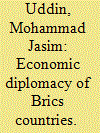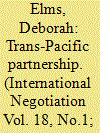|
|
|
Sort Order |
|
|
|
Items / Page
|
|
|
|
|
|
|
| Srl | Item |
| 1 |
ID:
143828


|
|
|
|
|
| Summary/Abstract |
Divergence of economic diplomacy among the BRICS (Brazil, Russia, India, China and South Africa) countries produces variation in their external economic settings. Bangladesh may not be able to follow the whole of economic diplomacy exercised by BRICS countries. Even a particular country’s entire initiatives may not be fully suitable for Bangladesh. Economic diplomacy of Bangladesh could be benefited from mutual learning and exercising best practices of BRICS countries. Diplomatic networks of Bangladesh’s Ministry of Foreign Affairs (MoFA) need to be attuned with changing global economic diplomacy. Bangladesh should realise that economic diplomacy differs based on competence and skills of diplomats engaged in international economic negotiations. Otherwise, consolidation of Bangladesh’s foreign affairs and its economic promotion would be tricky.
|
|
|
|
|
|
|
|
|
|
|
|
|
|
|
|
| 2 |
ID:
120715


|
|
|
|
|
| Publication |
2013.
|
| Summary/Abstract |
Abstract This article offers a conceptual analysis of the negotiation of the Comprehensive Economic and Trade Agreement (CETA) between Canada and the European Union. It argues that traditional accounts of the structure of trade negotiations must be tailored for their novel nature, especially their wider scope on various regulatory issues and the relative economic weight of trading partners. To build our argument, we revisit traditional structural factors such as economic interdependence, non-agreement alternatives (NAA), institutional constraints, outcome valuations, and domestic support. We conclude that current and future bilateral trade negotiations will likely last longer, deadlocks will likely become more frequent, and that variations in scope will likely increase.
|
|
|
|
|
|
|
|
|
|
|
|
|
|
|
|
| 3 |
ID:
120716


|
|
|
|
|
| Publication |
2013.
|
| Summary/Abstract |
Abstract Much has been made of the "spaghetti or noodle bowl" problem of overlapping preferential trade agreements (PTA). A new PTA, the Trans-Pacific Partnership (TPP), currently under negotiation between eleven states - Australia, Brunei, Canada, Chile, Malaysia, Mexico, New Zealand, Peru, Singapore, the United States and Vietnam - is intended to help address this issue. The TPP will lower or eliminate barriers to trade among the partners. But officials are not operating in a vacuum as they negotiate this new agreement. Instead, they must contend with rules created in previous agreements, many of which link TPP partners together in ways that constrain their options now. This article looks in detail at negotiations over market access in goods to better understand the tradeoffs faced by negotiators. Unfortunately, some of the decisions made so far after three years of talks suggest that the TPP market access deal could end up being just another twisted noodle in a crowded bowl.
|
|
|
|
|
|
|
|
|
|
|
|
|
|
|
|
|
|
|
|
|